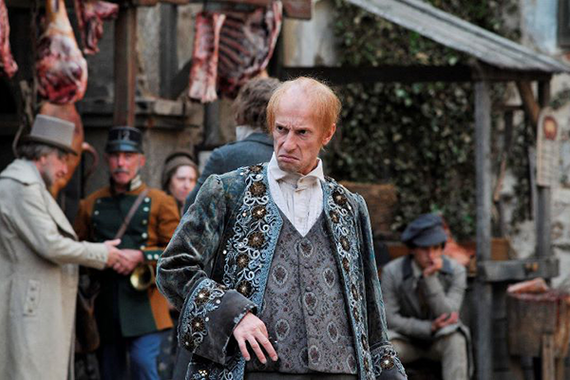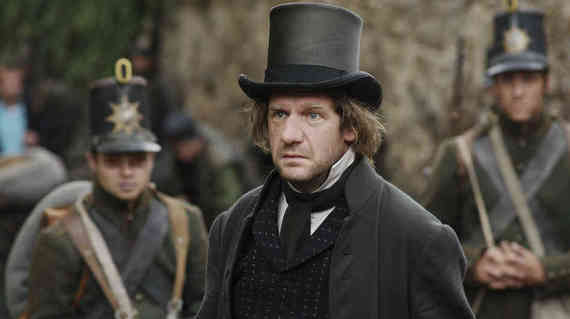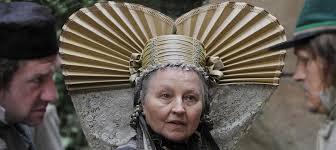Faust- mein Gott! The story's still kicking! Johann Wolfgang von Goethe's classic has been produced yet again, this time in cinematic form, in a film that is as wondrous as it is strange.
Winner of the Golden Lion Award at the Venice Film Festival, this German/Russian collaboration owes much to the film heritage of both countries, with a visual style and sensibility that recalls both the German Expressionist The Cabinet of Dr. Caligari and Eisenstein's Ivan The Terrible.
Faust is the fourth in a series directed by Aleksandr Sokurov portraying 20th century political tyrants: Hitler, Lenin and Hirohito. This last installment of Faust arguably reveals their damning motivations.
Bewitchingly bizarre, the film is cinematic in the best way. It is carried not so much by the story line as the sensory elements, the play of sight and sound, the wild costuming and whispering voices. In watching it, don't focus too much on the sequencing of events but surrender to its dream-like, sensory-laden world.
Johannes Zeiler, a German television actor, plays Faust and convincingly embodies conflicting impulses. While he searches for meaning with a childlike longing for spiritual grace, it doesn't take long for Mauricius the moneylender to tempt him into ruin. Played by Anton Adasinsky (fittingly cast as Herr Drosselmeyer in a 2008 production of The Nutcracker) this wheedling, wily Mephistopheles is unsavory in every way.
After Mauricius ropes in Faust to join him in a murder, the devil gets Faust to sign a contract in his own blood sealing a deal in which he will relinquish his soul in exchange for a single night with the murdered man's sister, Margarete (Isolde Dychauk). This bait for Faust's downfall, a young woman ripe for the plucking, seems a cheap shot to a 21st century mind, but is bourn along by lovely camera work, soft-focus close-ups held so long they recall silent film in their powerful intimacy. Faust may hold higher ideals, but he's perfectly willing to be seduced.
Despite the high stakes of the bargain, the relationship between Faust and Mauricius is oddly chummy. They seem to share a partnership, Faust the seeker of the answer to life, Mauricius the corruptor taking advantage of Faust's willingness to experiment. It feels more like a buddy movie than a harrowing journey to Hades.
And Mauricius himself is oddly comical as the devil, more absurd than threatening, with his pear-shaped body and awkward gait. When he enters the public bath, his nakedness exposes his gonads, but they're in the back, hanging limply from his coccyx like a tail. Around town he is treated as an object of derision; the village women greet him with taunts and ridicule.
The look of the film has something of the romantic landscapes of Caspar David Friedrich with fantastic vistas of craggy mountains and glacier-covered peaks. In contrast, the village shots harken more to the bawdy tavern scenes of the Flemish painter, Adriaen Brouwer, with a frenzied beer hall scene of men banging utensils on the table. Narrow alleys and foreshortened space create a sense of claustrophobia- even the woodland scenes appear as cramped spaces with no escape. At times the lens shifts into distortion; the palette is toned down, anemic in its faint wash of color.
Faust includes a fair share of the grotesque. The film opens with two men disemboweling a cadaver, looking for the soul that they can't seem to find. Weird events continue in an erotically charged scene in which a man pulls a hard-boiled egg out from beneath a woman's onion-layered skirts, which she then proceeds to crack open and eat. Then there's the bit with the man raving about how he's made a potion from oils of dandelion, asparagus, and the liver of jackal, from which he has created life, an ubermensch. He pulls a chemistry beaker out of his overcoat and voilà!- a tiny humanoid, Golem-like, blinking its watery eyes.
Faust's theatricality contributes to its distancing effect. Jump cuts between scenes are stage-like, abrupt switches of venue with no attempt at camera work that mimics experience. Historical costumes are quite theatrical, with men in tails and women in fan hats. Death figures skulk around in webby bits like Orcs from The Lord of the Rings.
The film is full of scoundrels for whom there seems little hope of redemption, though through it all Faust persists in reaching for a higher plane. Mauricius quips platitudes of what sounds like well-intentioned advice, meant to school Faust in the ways of the world. 'Hell is not full of exclusively bad people.' Another says, "I have no money for you, nor the meaning of life." Idealism and cynicism being two sides of the same coin, these characters are unmistakably human, understandable in their weaknesses and longings.
Perhaps Faust is a story for the ages, eternally appealing. This man who sells his soul to the devil in exchange for earthly rewards seems all the more relevant today, in an global world where celebrity stars shine brighter, stakes grow even higher, and the pot at the end of the rainbow is ever more elusive.


